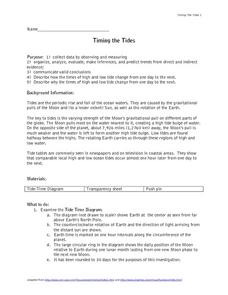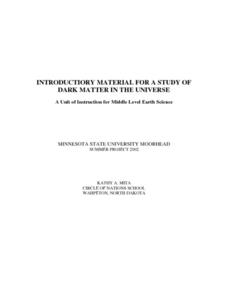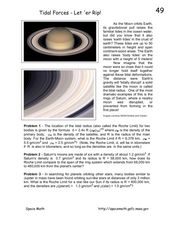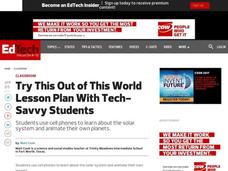Curated OER
Solar System
In this Solar System worksheet, students are quizzed. Students answer questions about the solar system and the planets and other celestial bodies that comprise it.
Curated OER
Timing the Tides
Students collect data and describe how and why the high and low tides change from day to day. In exploring tides activity students study tides by taking notes, recording data and analyzing their findings.
Curated OER
Watch This Space!
In this space worksheet, students, with a partner, answer five questions about the universe and read and discuss ten questions regarding astronomy.
Curated OER
Scavenger Hunt: Who am I?
In this space science activity, students use the sites listed on the Solar System and Planets page of the Kid Zone to locate the names of the people credited with each discovery. They identify and name 26 different scientists who made...
Curated OER
Where Is Saturn in the Solar System? Where Am I in the Solar System?
Students engage in a solar system activity, In this activity, students will read aloud as a class about the solar system. The students will then listen to the teacher read a solar system book prior to filling out a worksheet about their...
Curated OER
Asteroids
Students examine the different types of asteroids and how they enter the atmosphere. In this space lesson students use mashed potatoes to create an asteroid they can eat.
Curated OER
Catch Some Rays?
In this online interactive science rays worksheet, students read 5 questions and choose the multiple choice answer that answers each question correctly. Students answer 1 science question on rays online in the box provided.
Curated OER
How Do Eclipses Occur?
In this eclipses worksheet, students write in the 4 steps explaining how an eclipse occurs. This worksheet is a graphic organizer.
Curated OER
Sky Watchers: Ancient Astronomers
Students close their eyes and picture the sky. They are asked to brainstorm things they may see in the course of a night and day, such as the movement of the sun, moon, and stars. Students work in groups to coduct their research. They...
Curated OER
Time Intervals
For this time intervals worksheet, students solve 8 problems where they determine the time gamma-ray bursts last, the time black hole micro-flares are emitted, the time coronal mass ejections travel and the days between lunar phases of...
Curated OER
The Flat-Out Truth
In this Earth's shape learning exercise, students read an article about a gentleman who believes the Earth is flat. Then students complete 5 short answer questions.
Curated OER
Beyond The Earth Part I
Students explore the solar system. In this space science activity, students take notes on the solar system provided by their instructors. Students then collaborate to design a computer-generated drawing of the solar system.
Star Date
Solar System Scale Model Demonstration
Explore outer space and decorate your classroom with an astronomy project. Learners create a visual model with the creation of a scaled solar system using different sized balls.
Columbus City Schools
Experiencing Eclipses
Don't be caught in the dark! Young scientists investigate the causes of both solar and lunar eclipses using an interactive to help them understand the development of an eclipse over time. They then research facts and characteristics of...
NOAA
Tides
Low tides, high tides, spring tides, neap tides, diurnal tides, semidiurnal tides, mixed tides ... just how many types of tides are there? The 10th installment of a 23-part NOAA Enrichment in Marine sciences and Oceanography (NEMO)...
Curated OER
Dark Matter In The Universe
Students investigate the concept of dark matter and how it occurs in the universe. They conduct research using a variety of resources. Students use the information by reading at least two articles about dark matter. They also generate...
Curated OER
Why Do We Have Night?
Learners engage in a fun, creative way to discover how the Earth moves. This lesson helps students explain why there is day and night. It can also create curiosity to further study the solar system and eclipses!
Curated OER
Tidal Forces-Let'er Rip!
In this tidal forces worksheet, students read about the gravitational pull from the moon that causes the ocean tides. Students solve 3 problems including finding the Roche or the tidal radius for the Earth and Moon, comparing the Roche...
Curated OER
Gravity and the Planets
For this gravity worksheet, students read about the solar system and the effects of the gravity of the sun, the planets and the moon on the orbits of the planets. They answer three critical thinking questions about gravity.
Curated OER
Out of This World
Fifth graders animate their own planets. In this solar system lesson, 5th graders use smartphones and the software, GoKnow Sketchy, to create images for presentations on their created planets that appear to be animated when played at a...
Curated OER
Getting to Know Saturn: The Saturn System
Learners compare and contrast Earth and Saturn's planet features. In this space science lesson plan, students draw a diagram of the solar system and identify the different components. They complete a Saturn system scavenger hunt and Venn...
Curated OER
World In Motion Curriculum
Middle schoolers explore the night sky and its solar system. Using a Digitarium planetarium system, students observe four constellations. They discover the phases of the moon and eclipses. Middle schoolers recognize the difference...
Curated OER
Sampling Rocks
Students investigate rocks. In this earth science lesson, students collect rocks from the schoolyard and describe each of the rocks. Students measure and weigh each rock and record the results. Students create a rock guide for the...
Curated OER
Planets in Proportion
Students apply estimation strategies and proportional reasoning to determine a scale comparing the planetary bodies to Earth. They convert measurements of time and distance using scientific notation. Both the metric and customary units...
Other popular searches
- Earth Moon Sun System
- Sun Earth and Moon
- Sun Moon Earth
- Earth and Moon and Sun
- Earth, Moon and Sun
- Rubric Sun Moon Earth
- Sun, Earth and Moon
- Sun Earth Moon System

























